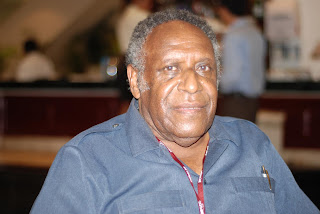 |
| Ambassador Williams |
By Makereta Komai, Climate Pasifika Media Team in Cancun
02 DECEMBER 2010 CANCUN, MEXICO ---- Overwhelming support at the Cancun talks for two proposals by the Alliance of Small Islands States (AOSIS).
Led by Grenada and Tuvalu, the AOSIS group was given the green light for its proposals to set up two separate contact groups to discuss a legal form to the new agreement likely to be in place by 2011 and resolving a gap that will be created after the first commitment period of the Kyoto Protocol expires in 2012.
Ambassador Dessima Williams of Grenada said the small and vulnerable countries that make up AOSIS want a ‘space’ to freely discuss the architecture and legal form of a new legally binding agreement to be formalized in Durban, South Africa in 2011.
All members of the Pacific Islands Forum, except Australia and New Zealand are members of the AOSIS. It’s one of the recognised negotiating groups at the UN climate change talks.
“These have always been considered in open-ended negotiating forums - open to all Parties and observers. This was the case in Kyoto, for example, for the consideration of the proposed Kyoto Protocol.
“It is not efficient, nor useful, to consider the proposals in a plenary meeting of the COP and as with other items on the COP Agenda, the proposal requires its own separate discussion, said Ambassador Williams.
Despite opposition from India, China and Saudi Arabia the President of COP16 ruled in favour of the proposal, to a rousing applause from delegates and observers.
India and China reminded the chair of the limited time for negotiations here in Cancun and not allow the AOSIS proposal to side track the process. They argued that the new agreement and its legal form are already part of the negotiations in the two Ad Hoc Working Groups on long term co-operative action (LCA) and the Kyoto Protocol (KP).
Both AOSIS and Tuvalu had submitted similar proposals to the climate change Secretariat last year under Article 17 of the UN Framework Convention on Climate Change.
Tuvalu chief negotiator, Ian Fry said it had been an 18 months wait for the proposal t come before the Conference of Parties.
“We support the AOSIS proposal that a contact group be established to explore means to reach an agreement in South Africa, said Fry.
Ambassador Williams said despite the multitude of meetings that have been taken place in recent years, “we do not have an effective, visible and lasting place for discussions on architectural proposals or on legal form.”
“Legal form is important as it provides certainty to the outside world – the governments, the markets, the private sector that we are trying to get involved in this process – all of them need legal certainty to effectively contribute to this process and to make the investments needed.
This is not the first time that AOSIS has taken such a leadership role.
“The Secretariat’s records will show that AOSIS tabled the first draft of the Kyoto Protocol, well in advance of its final adoption”, said Ambassador Williams.
“In that regard, AOSIS would call for creation of an open-ended contact group to consider proposals related to this agenda item, to be conducted under the direct guidance and facilitation of the COP Presidency.
COP President, Patricia Espinosa after consulting with her advisers approved the setting up of the contact groups, warning however that the work of this new contact group will not hinder the current negotiations in the LCA and KP processes.
“This will allow more dialogue and better understanding between Parties before a final agreement is ready, said Espinosa.

















